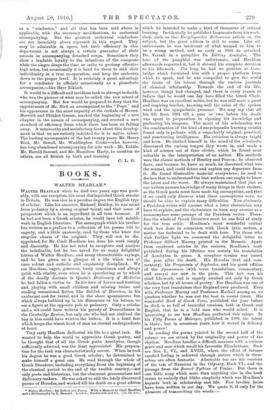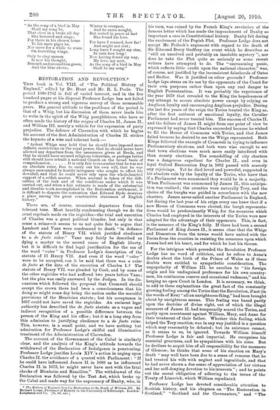BOOKS.
WALTER HEADLAM.* WALTER HEADLAM when he died two years ago was prob- ably, with one exception, the most distinguished Greek scholar in Britain. He was also in a peculiar degree the English type of scholar. Like his ancestor, Richard Bentley, he was saved from pedantry by a strong original talent, and that sense of perspective which is an ingredient in all true humour. If he had not been a Greek scholar, he would have left notable work in English literature. The monograph which his brother has written as a preface to a collection of his poems will be eagerly, and a little anxiously, read by those who knew the singular charm of the original. They will not be dis- appointed, for Mr. Cecil Headlam has done his work simply and discreetly. He has not tried to recapture and analyse the indefinable, but he has saved for us many delightful letters of Walter Headlam, and many characteristic sayings, and he has given us a glimpse of a life which was at once robust and catholic and exquisitely disciplined. We see Headlam, eager, generous, hasty sometimes, and always quick with vitality, even when he is speculating as to which of the deadly diseases in Quain's Dictionary of Medicine he had fallen a victim to. In his love of horses and hunting and playing with small children and missing trains and reading sensational fiction like Delilah of Haarlem, in his exuberant zest for travel, and in the sheer spontaneous fun which always bubbled up in his discourses or his letters, we see a figure at the opposite pole to pedantry. Only a scholar and a wit could have written his parody of Demosthenes in the Cambridge Review, but only one who had not outlived the boy in him could have written the letters. It is a kind fate which keeps the wisest kind of man an eternal undergraduate at heart.
Very early Headlam dedicated his life to a great task. He wanted to help the world to appreciate Greek poetry, and he thought that of all the Greek poets Aeschylus, though sufficiently admired, was the least appreciated. His prepara- tion for the task was characteristically severe. When he took his degree he was a good Greek scholar ; he determined to make himself a great one. He read through the whole of Greek literature, including everything from the beginning of the classical period to the end of the twelfth century,—not only poets and historians, but the obscurest grammarians and dictionary-makers. He was asked to edit the lately discovered poems of Herodas, and worked till his death on a great edition
'• Walter Headieret Ms Letters and Poems. With a Memoir by Cecil Headlam and a Bibliography by L. }Inward. London : Duckworth and Co. [7s. 6d. net.] which he intended to make a kind of thesaurus of critical learning. Incidentally he published fragments from his work- shop, such as the Encyclopaedia Britannica article on the subject, but the great edition is still to come. Like all enthusiasts, he was intolerant of what seemed to him to be a wrong method, and as early as 1891 he attacked Dr. Venal' in a pamphlet On Editing Aeschylus. The tone of the pamphlet was unfortunate, and Headlam afterwards regretted it, but it showed his complete devotion to his life-work. For long he had no position at Cam- bridge which furnished him with a proper platform from which to speak, and he was compelled to give the world the fruits of his labour through the various journals of classical scholarship. Towards the end of his life, however, things had changed, and there is every reason to believe that he would one day have filled the Greek Chair. Headlam was an excellent writer, but he was still more a great and inspiring teacher, knowing well the value of the spoken word and the sympathetic presence. We may say that all his life from 1891 till a year or two before his death was spent in preparation, in ripening his knowledge and perfecting his weapons. The merit of his scholarship was the combination of the kind of encyclopaedic learning usually found only in pedants with a remarkably original, practical, and penetrating intelligence. His criticism is always bright and keen. He clothed himself in the mind of the scholiasts, discovered the curious tongue they wrote in, and made a kind of science out of their cliches, which he found most valuable in the interpretation of an author. His methods were the classic methods of Bentley and Porson ; he observed facts, and because he knew so much, he discerned what was the normal, and could detect and explain any departure from it. He found illustrative material everywhere ; he used to declare that to understand the best authors one ought to know the latest and the worst. He always maintained that just as our writers assume knowledge of many things in their readers, so the Greek poets must have made big assumptions, and that if we could only discover what these assumptions were, we should be able to explain many difficulties. Now obviously a Periclean writer will assume what a later rhetorician may have to explain, and the rhetorician in turn may assume as a commonplace some passage of the Periclean writer. There- fore the whole of Greek literature must be one field of study for the true critic. Headlam's most wonderful critical work was done in connexion with Greek lyric metres, a matter too technical to be dealt with here. For those who wish further light we commend the delightful letter to Professor Gilbert Murray printed in the Memoir. Apart from scattered articles in the reviews, Headlam's work published during his lifetime was mainly his translation of Aeschylus in prose. A complete version was issued the year after his death. His Herodas (text and com- mentary), his Fragments of Sophocles, and his great edition of the Agamemnon (with verse translations, commentary, and essays) are now in the press. This last was his chief life-work, and is eagerly awaited not only by Greek scholars, but by all lovers of poetry. For Headlam was one of the very best translators that England ever produced. Even with Professor Murray and Professor Mackail among us, we question whether be was not the best in recent times. His wonderful Book of Greek Verse, published the year before be died, is so full of beautiful versions, both in Greek and English, that he is a bold man who would select. It is interesting to see how Headlam perfected this talent. In his Fifty Poems of Meleager, published in 1890, the talent is there ; but in seventeen years bow it waxed in delicacy and power !
In reading the poems printed in the second half of the volume we are struck by the originality and power of the rhythm. Headlam handles a difficult measure with a curious grace and ease which recall his favourite Elizabethans. Such are Nos. I., VI., and XVIII., where the effect of intense rarefied feeling is achieved through metres which in them- selves are often fantastic. Admirable too are his versions of the tale of Nausicaa in the Odyssey, Book VI., and the passage from the Second. Pythian of Pindar. But there is one little song which more than anything else in the book seems to embody that blithe simplicity which was Headlam's keynote both in scholarship and life. Few lovelier. lyrics have been written in our day. We quote it, if only fer the pleasure of transcribing the words :—
"As the song of a bird in May Shall my song be, That close in a brake all day Sits bowered and sings ; For there in his chosen home To his mate pipes he, Nor cares for a while to roam On travelling wings.
Only to sing unseen Is now his thought, Beneath and around him green, And the blue above; Winter is overpast,
And he cares nought, But rested in peace at last
Has found his love.
Far have I roamed, how far! And might not rest; Long have I sought my star, In vain how long !
Nov having found my way, My love, my nest, As the song of a bird in May Shall be my song."







































 Previous page
Previous page